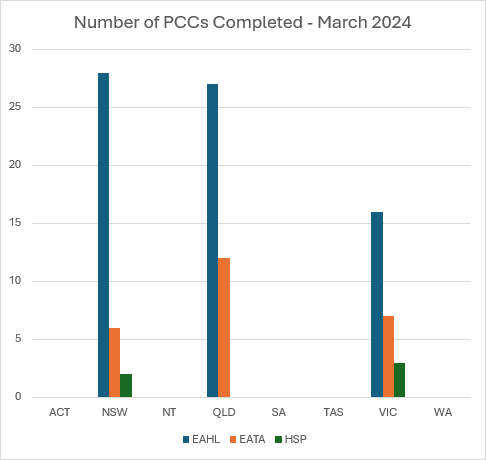Field Engagement Report from June 2025:
In June 2025, 46 Permit Condition Checks (PCCs) were completed across different regions of the country.
- 45 EAHL permit holders
- 0 EATA permit holder
- 1 HSP permit holders
Broken down into states, these numbers are as follows:
- New South Wales (NSW):
- EAHL – 9
- HSP – 1
- Queensland (QLD):
- EAHL – 12
- Victoria (VIC):
- EAHL – 6
- Western Australia (WA):
- EAHL – 18
A strong number of outcomes were recorded during these PCCs. Of the 46 EAHL PCCs, only 10 of these required no further action.
For EAHL PCCs, outcomes discovered included; applications for Trainee Licenses, discharge reporting education, information on obtaining additional entitlements, safe disposal education, scheduled gas information, stickers requested, physical EAHL card requests, and updated details.
Minimal outcomes were recorded for this reporting period for HSP permits as only one HSP was visited. The only outcome from this sole visit was further education being provided.
Non-compliance
There were no instances of non-compliance discovered during PCCs in June.
Resolved Non-compliance
Following a PCC conducted in late May, a tip-off into unlicensed activity was received and an investigation launched. The suspected non-compliance was regarding maintenance of FM-200 suppression systems without possessing a suitable EAHL. The Board was quickly able to reach out to the company in question, who then confirmed a very recent new employment of a suitably qualified EAHL permit holder. This opportunity was also used to educate the company on the rules and regulations around working with scheduled extinguishing agents. The investigation has now been closed and will only reopen if further evidence appears.
Discharge Reports Received
There were two discharge reports received in June. Both were mining related and originated from sites in Western Australia. The quantities involved were significant with 451kg and 313kg of HFC227ea (FM-200) being discharged. In both instances, the root cause was deemed to be an electrical fault with both issues being fixed prior to replacement of extinguishing agent cylinders and systems going live again. The Board is aware of the company’s intention to phase out use of FM-200 across all their sites in the future and are satisfied that this process has already commenced.
New Permit Holders
There were 12 new permit holders granted in June 2025, as follows:
- EAHL Qualified – 8
- EAHL Combined – 2
- Trainee EAHL – 2
63 EAHL permits were processed in total.
Eight (8) permits had lapsed and have now been reactivated. The breakdown of these is:
- EAHL Qualified – 5
- EAHL Combined – 3
Field Engagement Report from May 2025:
In May 2025, 82 Permit Condition Checks (PCCs) were completed across different regions of the country.
- 80 EAHL permit holders
- 2 EATA permit holder
- 0 HSP permit holders

- New South Wales (NSW):
- EAHL – 8
- EATA – 1
- Queensland (QLD):
- EAHL – 1
- Victoria (VIC):
- EAHL – 45
- EATA – 1
- Western Australia (WA):
- EAHL – 26
These numbers are reflective of the Field Team’s attention during May being focused on capturing the larger pool of license holders who had not yet completed a PCC in both Victoria and Western Australia. As always, interstate field trips often require a higher level of logistical planning to ensure they are successful in capturing as many permit holders as possible.
A strong number of outcomes were recorded during these PCCs. Of the 80 EAHL PCCs, only 18 of these required no further action.

For EAHL PCCs, outcomes discovered included; applications for additional entitlements, discharge reporting education, information on obtaining additional entitlements, safe disposal education, scheduled gas information, stickers requested, update details, requests for physical license cards, and report of unlicensed activity.

Outcomes for EATA permits included: sticker requests, discharge reporting education, and scheduled gas information.
Non-compliance
There were two instances of non-compliance discovered during PCCs in May. Both related to EAHL permit holders undertaking works outside their license class. Both were existing holders of EAHL X6 but required a combination of license classes 2 and 3 in order to remain compliant.
Resolved Non-compliance
At the time of writing, one individual has already successfully obtained the additional license entitlements required. The other permit holder has been issued with an initial 28-day notice period and provided with advice on which units they are required to undertake in order to obtain license entitlement 3. This technician has advised that they are currently in discussions with their employer as to whether they will undergo training toward this extra entitlement or sign a declaration form stating that they will no longer work with scheduled agents.
Discharge Reports Received
There was one discharge report received in May. This incident arose from the Mining sector with 88kg of HFC227ea (FM-200) discharged. This incident occurred in an unmanned switch room at a coal mine in NSW, and was due to a mechanical fault involving the manual call point being attached to the fire protection system.
New Permit Holders
There were 10 new permit holders granted in April 2025, as follows:
- EAHL Qualified – 5
- EAHL Experienced – 2
- Trainee EAHL – 2
- HSP – 1
70 EAHL permits were processed in total.
Thirteen (13) permits had lapsed and have now been reactivated. The breakdown of these is:
- EAHL Qualified – 6
- EAHL Combined – 4
- EAHL Trainee – 1
- EATA – 2
Preventing Avoidable Discharges in the Marine Sector:

Fire suppression systems are crucial for safety in the marine industry, but the use of scheduled extinguishing agents can lead to the release of harmful Ozone Depleting Substances (ODS) and Synthetic Greenhouse Gases (SGGs). To mitigate these risks, the Fire Protection Industry (ODS & SGG) Board emphasises the importance of awareness among technicians, and vessel operators and owners regarding licensing and best practices to prevent avoidable discharges. This plays a critical role in protecting the Earth’s environment and ozone layer.
Vessel operators, owners and technicians can all play an important role in taking proactive steps to avoid a preventable discharge. Key recommendations to consider include:
- Regular Maintenance: Gaseous fire suppression systems should be serviced annually, while portable extinguishers require servicing every six months to ensure effectiveness and prevent discharges.
- Pressure Testing: Vessel owners should have fixed fire suppression systems and portable extinguishers pressure tested every five years to check for leaks and maintain proper function.
- Licensed Technicians: Vessel owners should be aware that the installation and maintenance of gaseous fire suppression systems must be conducted by licensed professionals.
- It is a requirement by law, that technicians must hold the appropriate licenses when handling scheduled extinguishing agents.
While it is not mandatory, the Board encourages owners to consider environmentally friendlier alternatives, such as Novec™ 2120 ore inert gases, during major servicing.
For more information on scheduled extinguishing agents in the marine sector, please refer to our factsheets.
Field Engagement Report from April 2025:
In April 2025, 50 Permit Condition Checks (PCCs) were completed across different regions of the country.
- 50 EAHL permit holders
- 0 EATA permit holder
- 0 HSP permit holders
Broken down into states, these numbers are as follows:
- New South Wales (NSW):
- EAHL – 14
- Queensland (QLD):
- EAHL – 5
- South Australia (SA):
- EAHL – 9
- Western Australia (WA):
- EAHL – 22
A strong number of outcomes were recorded during these PCCs. Of the 50 EAHL PCCs, only 14 of these required no further action.
For EAHL PCCs, outcomes discovered included; Applications for additional entitlements, discharge reporting education, education on entitlements, safe disposal education, information on alternative extinguishing agents, stickers requested, updated details, and EAHL training course information.

No EATAs or HSPs were visited during this reporting period. As most of these permit holders have now completed a permit check with the Board, visits in this category are anticipated to remain low and are largely dependant on new applicants joining the permit scheme.
Non-compliance
There were no instances of non-compliance discovered during the month of April.
Discharge Reports Received
There was one discharge report received. This incident involved 3.18 kilograms of Halon 1301 and was the result of human error.
New Permit Holders
There were 10 new permit holders granted in April 2025
- EAHL Qualified – 5
- Trainee EAHL – 4
- HSP – 1
50 EAHL permits were renewed.
Six (6) permits had lapsed and have now been reactivated. The breakdown of these is:
- EAHL Qualified – 4
- EAHL Combined – 1
- EAHL Trainee – 1
Field Engagement Report from March 2025:
In March 2025, 52 Permit Condition Checks (PCCs) were completed across different regions of the country, across the ACT, New South Wales, Queensland, South Australia, Victoria and Western Australia. Across permit types this included:
- 48 EAHL permit holders
- 4 EATA permit holder
- 0 HSP permit holders
Broken down into states, these number of PCC’s conducted are as follows:
- Australian Capital Territory (ACT):
- EATA – 1
- New South Wales (NSW):
- EAHL – 11
- Queensland (QLD):
- EAHL – 5
- EATA – 1
- South Australia (SA):
- EAHL – 17
- EATA – 1
- Victoria (VIC):
- EAHL – 1
- Western Australia (WA):
- EAHL – 14
- EATA – 1
A strong number of outcomes were recorded during these PCCs. Of the 48 EAHL PCCs, only 12 of these required no further action.
For EAHL PCCs, outcomes discovered included, applications for additional entitlements, discharge reporting education, information on penalties and infringements, safe disposal education, scheduled gas information, stickers requested and updated details.
Outcomes for EATA permits included stickers requests, minimal outcomes were recorded this reporting period which was likely due to the relatively low number of EATAs visited. Of the 4 EATA PCCs completed in March, 2 required no further action.

Non-compliance
There was one instance of non-compliance discovered during an EATA PCC in March. This was related to a Risk Management Plan not being readily available on site.
Resolved Non-compliance
Following the discovery of a Risk Management Plan non-compliance against the EATA holder, it was quickly resolved by the permit holder with evidence provided to the Field Officer involved.
Discharge Reports Received
There were five discharge reports received in March. Of these five incidents, four were from the mining sector and one from the building industry. Incidents from the mining sector ranged from 48.5 to 227 kilograms of HFC227ea (FM-200). The building incident involved a considerable 257 kilograms of HFC227ea due to an actual fire event.
New Permit Holders
There were 9 new permit holders granted in March 2025
- EAHL – 8
- Trainee EAHL – 1
- EATA – 0
38 EAHL permits were renewed.
Ten (10) permits had lapsed and have now been reactivated. These are all EAHLs.
Avoiding Accidental Discharge in the Aviation Industry:

The aviation industry relies heavily on scheduled gases to ensure safety. Critical areas of an aircraft, such as lavatories, wheel wells, bleed air ducts, and cargo compartments, are all equipped with fixed fire detection and extinguishing systems.
One notable gas utilised in this sector is Halon. While it has been banned in other industries due to its significant ozone-depleting potential, halon remains permitted in aviation because of the unique space constraints of aircraft and its rapid effectiveness in extinguishing fires.
Halons are particularly effective as they disrupt the chemical chain reaction that sustains a fire. In Australia, the use of halon in aviation is regulated under the Ozone Protection and Synthetic Greenhouse Gas Management Act 1989 and the associated regulations from 1995. There are two primary types of Halon used in the industry: Halon 1301, which acts as a total flooding agent and Halon 1211, used as a streaming agent.
So what should technicians keep in mind to minimise the risk of an accidental discharge of scheduled gas in aviation? To adhere to regulations and minimise emissions, the Board advises the following actions for technicians in the aviation sector:
- Technicians handling scheduled extinguishing agents must hold the appropriate licenses, authorisations, or permits.
- Aviation site operators utilising gaseous fire suppression systems with scheduled extinguishing agents should employ licensed technicians for installation and maintenance.
- Regular servicing and maintenance of gaseous fire suppression systems are crucial for ensuring their effectiveness during fire emergencies.
- Licensed Aircraft Maintenance Engineers (LAMEs) and Aircraft Maintenance Engineers (AMEs) involved with scheduled extinguishing agents must complete the unit CPPFES2043A or an equivalent assessment to verify their competency.
For more information on scheduled gases in the aviation sector, click here.
Field Engagement Report from February 2025:
In February 2025, 34 Permit Condition Checks (PCCs) were completed.
- 26 EAHL permit holders
- 5 EATA permit holder
- 3 HSP permit holders
Broken down into states, these numbers are as follows:
- Australian Capital Territory (ACT): EATA – 1, HSP – 1
- New South Wales (NSW): EAHL – 11, EATA – 2
- Queensland (QLD): EAHL – 15, EATA – 2, HSP – 2
- Victoria (VIC): EAHL – 1
A strong number of outcomes were recorded during these PCCs. Of the 27 EAHL PCCs, only 14 of these required no further action.
For EAHL PCCs, outcomes discovered included: applications for additional entitlements, an application for an Extinguishing Agent Trading Authorisation (EATA), discharge reporting education, safe disposal education, scheduled gas information, a request for stickers and updated details.
Outcomes for EATA permits included: discharge reporting education, information on penalties, stickers requested and updated details. Of the 5 EATA PCCs completed in February, only 2 required no further action.
Outcomes for HSP PCCs included: discharge reporting education, record keeping education, surrendered agent information and update details. Of 3 HSP PCCs conducted, 1 required no further action.

Non-compliance
There was one instance of non-compliance discovered during a EATA PCC in February, this involved Quarterly Usage Reports not being submitted.
Resolved Non-compliance
Following the Quarterly Usage Reports non-compliance discovered against the EATA holder, it was quickly resolved by the permit holder.
Discharge Reports Received
There were three discharge reports received in February. Of these three incidents, two were in from the mining sector and one from aviation. The two incidents from the mining sector involved 50+ kilograms of HFC227ea (FM-200) and the aviation incident involved one single kilo of Halon 1301.
New Permit Holders
There was 20 new permit holders granted in February 2025
- EAHL – 13
- Trainee EAHL – 5
- EATA – 2
42 EAHL permits were renewed.
Seven (7) permits had lapsed and have now been re-activated, two (2) of these being EATAs and five (5) being EAHLs.
Ensuring you hold the correct licence: Your requirements as a trainee or employer in the fire protection sector
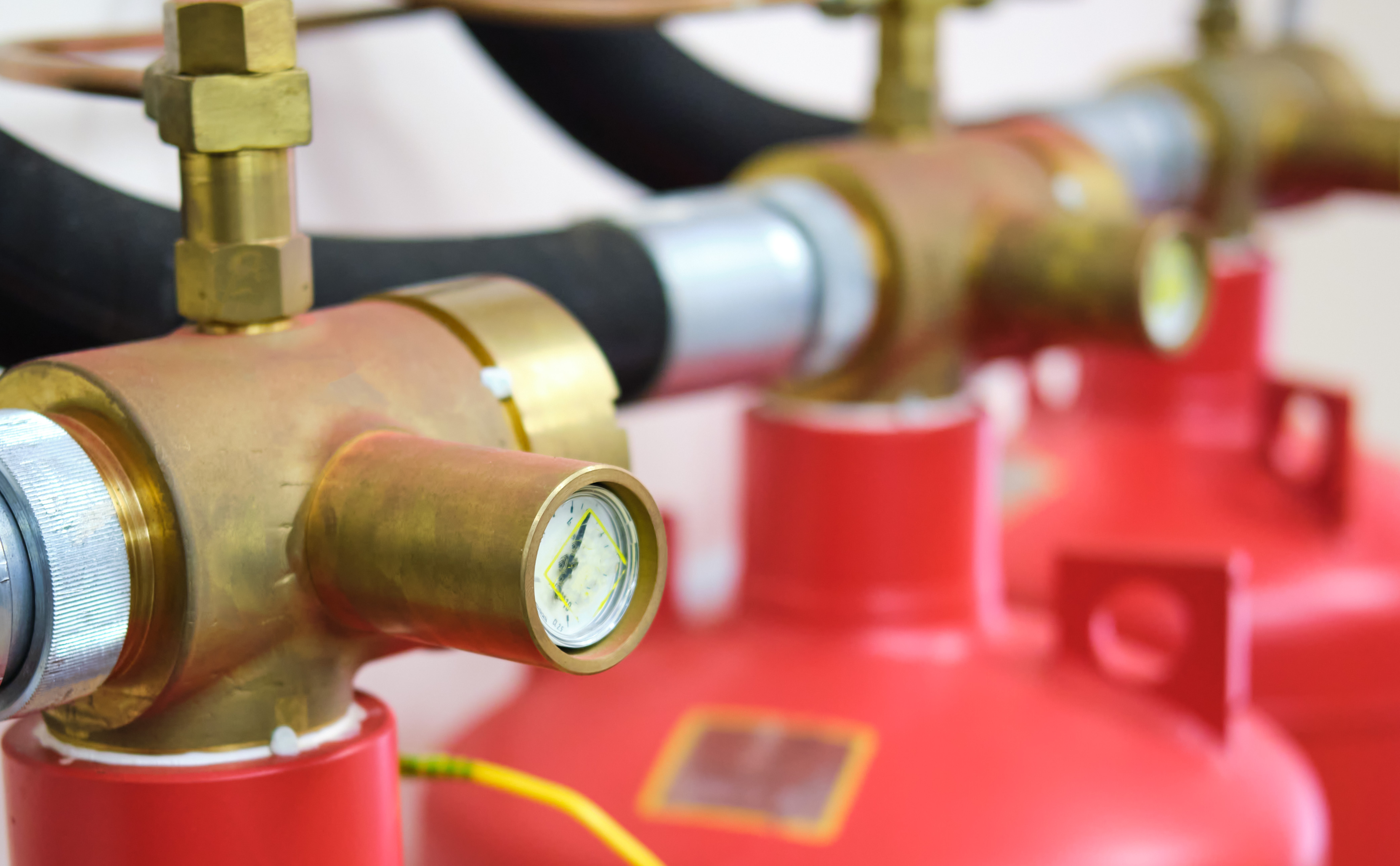
If you’re stepping into the fire protection industry and intend on working in the realm of scheduled extinguishing agents, obtaining your Extinguishing Agent Handling Licence (EAHL) is essential for anyone handling these materials. This crucial permit is mandatory for activities such as:
- Decanting extinguishing agents,
- Servicing fire protection systems—including gaseous fire suppression and portable extinguishers,
- Decommissioning or disposing of equipment containing scheduled substances.
For trainees, securing your EAHL not only fulfills your legal obligations but also enhances fire safety standards, protects the environment, and supports Australia’s commitments under the Montreal Protocol on ozone depletion.
Employers, if you’re intending on hiring or working with trainees, please be aware that anyone in your workforce dealing with these agents must possess an EAHL to comply with the Ozone Protection and Synthetic Greenhouse Gas Management Act & Regulations. Understanding these requirements is key to fostering a responsible and compliant workplace.
For further details on obtaining an EAHL, please visit our webpage on licence types.
Attention Mining Industry: The Importance of Reporting ODS & SGG Discharges
The mining industry plays a vital role in safeguarding the environment by ensuring all emissions, particularly those of ozone-depleting substances (ODS) and synthetic greenhouse gases (SGG), are reported, recorded, and minimised. These gases, commonly found in fire suppression systems, can significantly impact the ozone layer and contribute to climate change if not properly managed.
Why Reporting Matters
Reporting the discharge of ODS and SGG extinguishing agents is essential for several reasons:
- Tracking and Reducing Emissions– By documenting and monitoring discharges, the industry can better understand emission trends and implement effective reduction strategies.
- Supporting Sustainable Fire Protection Practices– Encouraging responsible use of fire suppression systems ensures long-term environmental sustainability.
Who Should Report?
The Board recommends that it is the responsibility of the Extinguishing Agent Handling Licence (EAHL) holder engaged by the service provider to report any discharge of ODS and SGG extinguishing agents. However, the Board strongly encourages any individual aware of a discharge incident to take action and make a report.
How to Report a Discharge
If a discharge occurs, it should be reported immediately to the Board. This proactive approach helps protect our environment and ensures compliance with regulatory requirements.
Reports can be submitted via:
- The Licence Holder Portal
- Our website: https://lnkd.in/gZV-r485
A Collective Effort for a Sustainable Future
Environmental protection is a shared responsibility. By reporting ODS and SGG discharges, the mining industry can play a crucial role in reducing harmful emissions and contributing to a more sustainable future. Let’s work together to safeguard our planet for generations to come.
Field Engagement Report January 2025
In January 2025, 16 Permit Condition Checks (PCCs) were completed.
- 15 EAHL permit holders
- 1 EATA permit holder
- 0 HSP permit holders
Broken down into states, these numbers are as follows:
- New South Wales (NSW) – EAHL – 2
- Queensland (QLD) – EAHL – 1
- Victoria (VIC) – EAHL – 12, EATA – 1

Despite January beinga relatively quiet month, a number of outcomes have been recorded during these PCCs.
For EAHL PCCs, outcomes range from applications for additional entitlements, discharge reporting education, safe disposal
education, physical card requested, scheduled gas information, update details, but the most common outcome in January was stickers requested.

Outcomes for EATA permits were one each for Trainee application requested for new trainees coming up, scheduled gas information, and stickers requested.

Non-compliance
There have been NO permit holders found to be non-compliant in January.
Resolved Non-compliance
In January, there have been two (2) non-compliance resolved.
- Undertaking work outside licence class (EAHL – 1)
- Expired permit (EAHL – 1)
Discharge Reports Received
There were NO discharge reports received in January, as a direct result of a Permit Condition Check being conducted.
New Permit Holders
There have been 14 new permit holders in January 2025 (EAHL – 11).
One (1) of these is a Trainee EAHL permit.
45 EAHL permits have been renewed, 2 EATA permits have been renewed.
19 EAHL permits had lapsed and have now been re-activated.
Field Engagement Report December 2024
In December 2024, 7 Permit Condition Checks (PCCs) were completed.
- 7 EAHL permit holders
- 0 EATA permit holders
- 0 HSP permit holders
Broken down into states, these numbers are as follows:
- New South Wales (NSW) – EAHL – 5
- Queensland (QLD) – EAHL – 2
As this was a very quiet month, only a few outcomes have been recorded during these PCCs. For 3/7 permit holders, there has been no further action required.
Other outcomes range applications for additional entitlements, stickers requested, safe disposal education, physical card requested, and one report of unlicenced activity.
Non-compliance
There have been NO permit holders found to be non-compliant in December.
Resolved Non-compliance
In December, there has been NO non-compliance resolved.
Discharge Reports Received
There were NO discharge reports received in December, as a direct result of a Permit Condition Check being conducted.
New Permit Holders
There have been 13 new permit holders in December 2024 (EAHL – 11, EATA – 1, HSP – 1).
One (1) of these is a Trainee EAHL permit.
39 EAHL permits have been renewed, 1 EATA permit has been renewed, 1 HSP permit has been renewed.
14 EAHL permits had lapsed and have now been re-activated.
Field Engagement Report November 2024
In November 2024, 97 Permit Condition Checks (PCCs) were completed.
- 90 EAHL permit holders
- 2 EATA permit holder
- 5 HSP permit holders
Broken down into states, these numbers are as follows:
- New South Wales (NSW) – EAHL – 19
- Queensland (QLD) – EAHL – 8, EATA – 1, HSP – 2
- Victoria (VIC) – EAHL – 10, HSP – 1
- Western Australia (WA) – EAHL – 53, EATA – 1, HSP – 2
Many outcomes have been uncovered during these PCCs. For 19/97 permit holders, there has been no further action required. Discharge Reporting Education, as always, has been one of the most prevalent outcomes, with 36/97 permit holders receiving some education on how, when and why to report discharges. ‘Stickers Requested’ has once again been a recurring outcome, with 34/50 permit holders requesting stickers for cylinders or panels, and ‘Updated details’ was another frequent and welcome outcome, with 20/97 permit holders updating their details in our system.
Other outcomes range from simple education required, to non-compliance which needs to be rectified by the permit holder.

Non-compliance
There have been 5 permit holders found to be non-compliant in November.
3 EAHL permit holders were undertaking works outside their EAHL entitlement class.
2 EAHL permit holder were working with an expired licence.

Resolved Non-compliance
In November, there has been two (2) non-compliance resolved, one (1) was for an expired EAHL permit, and one (1) for EATA – Quarterly Reports not submitted.
Discharge Reports Received
There were five (5) discharge reports received in November, as a direct result of a Permit Condition Check being conducted.
New Permit Holders
There have been 14 new permit holders in November 2024 (EAHL – 13, HSP – 1).
Two (2) of these are Trainee EAHL permits.
24 EAHL permits have been renewed, 2 EATA permits have been renewed, 3 HSP permits have been renewed, 1 SCE permit has been renewed.
16 EAHL and 1 HSP permits had lapsed and have now been re-activated.
Field Engagement Report October 2024
In October 2024, 50 Permit Condition Checks (PCCs) were completed.
- 44 EAHL permit holders
- 1 EATA permit holder
- 4 HSP permit holders
Broken down into states, these numbers are as follows:
- Australian Capital Territory (ACT) – EATA – 1, HSP – 1,
- New South Wales (NSW) – EAHL – 22, HSP – 2
- Northern Territory (NT) – EAHL – 4, HSP – 1
- Queensland (QLD) – EAHL – 9
- Victoria (VIC) – EAHL – 7
- Western Australia (WA) – EAHL – 2
Many outcomes have been uncovered during these PCCs. For 19/50 permit holders, there has been no further action required. Discharge Reporting Education, as always, has been one of the most prevalent outcomes, with 13/50 permit holders receiving some education on how, when and why to report discharges. ‘Stickers Requested’ has once again been a recurring outcome, with 10/50 permit holders requesting stickers for cylinders or panels, and ‘Updated details’ was another frequent and welcome outcome, with 14/50 permit holders updating their details in our system.
Other outcomes range from simple education required, to non-compliance which needs to be rectified by the permit holder.
Non-compliance
There have been 3 permit holders found to be non-compliant.
1 EAHL permit holder was undertaking works outside their EAHL entitlement class.
2 EAHL permit holder was working with an expired licence.

Resolved Non-compliance
In September, there has been six (6) non-compliance resolved, four (4) were for undertaking works outside EAHL licence type, one (1) for an expired EAHL permit, amd one (1) for EATA – Quarterly Reports not submitted.
Discharge Reports Received
There were three (3) discharge reports received in October, as a direct result of a Permit Condition Check being conducted.
New Permit Holders
There have been 13 new permit holders in October 2024 (EAHL – 12, HSP – 1).
Four (4) of these are Trainee EAHL permits.
20 EAHL permits have been renewed, 2 EATA permits have been renewed, 3 HSP permits have been renewed.
9 EAHL and 1 EATA permits had lapsed and have now been re-activated.
Fire Protection Industry (ODS & SGG) Board 2023 – 2024 Annual Report
The Fire Protection Industry (ODS & SGG) Board are pleased to share the 2023 – 2024 Annual Report. This Annual Report provides a comprehensive overview of the key achievements and advancements achieved by the Board in the past year and highlights the Board’s commitment to fostering compliance and best practice in the handling of ozone depleting scheduled gases in the fire protection industry through innovation, education, and collaboration within the industry.
You can access the 2023 – 2024 Annual Report here.
Field Engagement Report September 2024
In September 2024, 91 Permit Condition Checks (PCCs) were completed.
- 88 EAHL permit holders
- 1 EATA permit holder
- 2 HSP permit holders

Broken down into states, these numbers are as follows:
- New South Wales (NSW) – EAHL – 16
- Queensland (QLD) – EAHL – 16
- South Australia (SA) – EAHL – 32, HSP – 2
- Tasmania (TAS) – EAHL – 12
- Victoria (VIC) – EAHL – 12, EATA – 1



Many outcomes have been uncovered during these PCCs. For 18/91 permit holders, there has been no further action required. Discharge Reporting Education, as always, has been one of the most prevalent outcomes, with 47/91 permit holders receiving some education on how, when and why to report discharges. ‘Stickers Requested’ has once again been a recurring outcome, with 22/91 permit holders requesting stickers for cylinders or panels, and ‘Updated details’ was another frequent and welcome outcome, with 21/91 permit holders updating their details in our system.
Other outcomes range from simple education required, to non-compliance which needs to be rectified by the permit holder.
Non-compliance
There have been 6 permit holders found to be non-compliant.
3 EAHL permit holders were undertaking works outside their EAHL entitlement class.
2 EAHL permit holder was working with an expired licence.
1 EATA permit holder was not up to date with submitting their Quarterly Usage Reports.

Resolved Non-compliance
In September, there has been three (3) non-compliance resolved, two (2) were for undertaking works outside EAHL licence type, one (1) for an expired EAHL permit.
Discharge Reports Received
In September there was one (1) discharge report received in September, as a direct result of a Permit Condition Check being conducted.
New Permit Holders
There have been 7 new permit holders in August 2024 (EAHL – 5, HSP – 1).
2 of these are Trainee EAHL permits.
24 EAHL permits have been renewed, and 14 EAHL permits had lapsed and have now been re-activated.
Scheduled Gases Used in the Marine Industry
30 September 2024

Safety is paramount in the Australian maritime sector, and one critical aspect is fire suppression safety. As many people within the Australian maritime sector know, the marine industry is exposed to various fire hazards, ranging from engine room mishaps, galley accidents and more. Vessels that can be affected by fire range from leisure craft through to fishing boats, work boats, tugs and tenders to ferries, roll on-roll off ships, offshore supply vessels, cruise ships, bulk carriers, tankers, LNG carriers, container ships and warships. Significantly, whether in domestic or international waters, all forms of vessels can be prone to fire danger so it’s important to take precautions and safety at sea seriously.
So, what is the best way to stay safe on the water and where you should you look to make sure you’re adhering to applicable fire safety laws and regulations? One such place for advice is the
Fire Protection Industry Board (FPIB). Acting on behalf of the Federal Government’s Department of Climate Change, Energy, Environment and Water (DCCEEW), the FPIB plays a pivotal role in setting guidelines and recommendations to ensure that the maritime industry adheres to the highest standards of fire safety. Additionally, in line with global environmental initiatives, the Board administers the fire protection division of the Ozone Protection and Synthetic Greenhouse Gas Regulations 1995 (the Regulations) on behalf of the Australian Government, managing the permit and licensing systems of individuals, workers and businesses who handle scheduled extinguishing agents for fire protection.
To mitigate the risks of fire on board vessels, the FPIB has developed comprehensive guidelines for fire suppression systems on ships, whilst working to ensure all fire suppression agents adhere to environmental regulations set by the Federal Government. Primarily the most commonly used scheduled extinguishing agents used within the maritime sector are: FM-200®, FE-227™ and NAF S-III because of their ability to act as leading alternatives to Halon. Notably, for maritime workers, working within domestic waters each of these agents must be obtained from companies who hold an EATA (Extinguishing Agent Trading Authorisation), a permit which is issued by the FPIB. FM-200® can protect from most of the hazards that halon does but is significantly less toxic. Halon was banned from being imported into Australia or used on commercial flagged vessels in 1993 as agents controlled under the Montreal Protocol. This is because the ozone depleting potential (ODP) and global warming potential (GWP) of halon is far higher than carbon dioxide (CO2). Notably, Halon also has an ODP of 10 (meaning that it is 10 times more potent in destroying the atmosphere) and a GWP of 6200 (meaning that it is 6200 times as potent as CO2 in warming the atmosphere).
For Australian workers or Australian owned companies working internationally within the fire safety space, it is worth noting that any fire systems you have in place on your ships must be in accordance with International Maritime Organisation (IMO) requirements. In international waters, halon systems are still permitted. For anyone working within this international context halon can be purchased from the National Halon Bank or companies which hold a Halon Special Permit (HSP) and an Extinguishing Agent Trading Authorisation (EATA). For international workers access to supplies of halon is limited and minimum quantities will only be provided for recharging gaseous fire suppression systems to ensure safe operation.
So what are the Board’s suggestions for keeping you, your crew and your vessel safe and protected from fire? Firstly, the Board recommends that builders, operators, and owners of vessels with gaseous fire suppression systems containing scheduled extinguishing agents ensure that the installation and maintenance of these systems is done by licensed technicians. Regular maintenance and service of gaseous fire suppressions should be conducted frequently to ensure full functionality in the event of a fire and all technicians working with scheduled extinguishing agents must hold the appropriate licence, authorisation or permit. The value and effectiveness of marine gaseous fire suppression systems requires that they be properly designed, installed, commissioned, and maintained effectively. Put simply, if you don’t get these elements right your fire protection system is more likely to fail when you need it. Taking these steps will also help ensure your acting in compliance within relevant Government acts and legislations, and whilst there is no requirement to replace systems, owners should consider changing systems to environmentally friendly alternatives where possible. There are a number of extinguishing agents that are not regulated under the government. For example, owners may wish to consider systems which use Novec™ 1230, inert gas or condensed aerosols.
For both international and domestic shipping, not only is following the recommendations outlined by the Fire Protection Industry Board an important way of keeping yourself, your vessel, and crew members safe, but staying compliant with the relevant regulations is critical in helping international duties and obligations in reducing ODS’s and Synthetic SGG’s under the Montreal Protocol. The environment is protected by strictly controlling the discharge of scheduled extinguishing agents (other than for putting out fires) and regulations govern the acquisition, possession, handling, storage and disposal of scheduled extinguishing agents, particularly when used within Australian waters.
So what is the Montreal Protocol and what does it have to do with extinguishing agents? The Montreal Protocol is an international treaty adopted in 1987, which aims to protect the ozone layer by phasing out the production and consumption of ODS’s. While the primary focus has been on substances like chlorofluorocarbons (CFCs) and halons, recent attention has also moved towards synthetic greenhouse gases (SGGs) due to their impact on climate change. Compounds within the scheduled gases used within many fire suppression systems and extinguishing agents, when exposed to intense UV light in the stratosphere, release chlorine and bromine. These atoms when in the stratosphere destroy ozone molecules, which contributes to creating larger holes in the stratosphere. Stopping the release of these gases from entering the atmosphere and creating damaging holes in the earth’s Ozone layer is crucial in helping avert environmental disaster. Essentially, A depleting ozone layer results in an increase of UV radiation passing through the stratosphere. Increased UV radiation leads to poor human health, especially increased skin cancer, and has potential dire consequences to the rest of the environment.
Ultimately, environmental responsibility and care using fire suppression systems and extinguishing agents in the maritime sector goes beyond regulatory compliance. It is a moral imperative and the shipping industry, and in particular cargo and freight, is a significant contributor to domestic and global trade, that must also bear the responsibility of minimising its environmental footprint. By adopting fire suppression systems where possible that don’t rely on ODS or SGGs, or preventing entirely the required use of an extinguishing agent, the industry can demonstrate a commitment to sustainable practices, safety and help meet the targets of the Montreal Protocol. It is crucial that all those working within shipping work collectively to meet this targets and lead by example for the global community. The maritime sector’s contribution to these efforts involves proper maintenance and disposal of existing systems containing ODS’s and SGG’s. By integrating both safety and sustainability measures, through the acquisition of the appropriate license, training and maintenance, the maritime sector can navigate the challenges ahead while leaving a positive impact on both industry and the environment.
National Halon Collection Continues in 2024
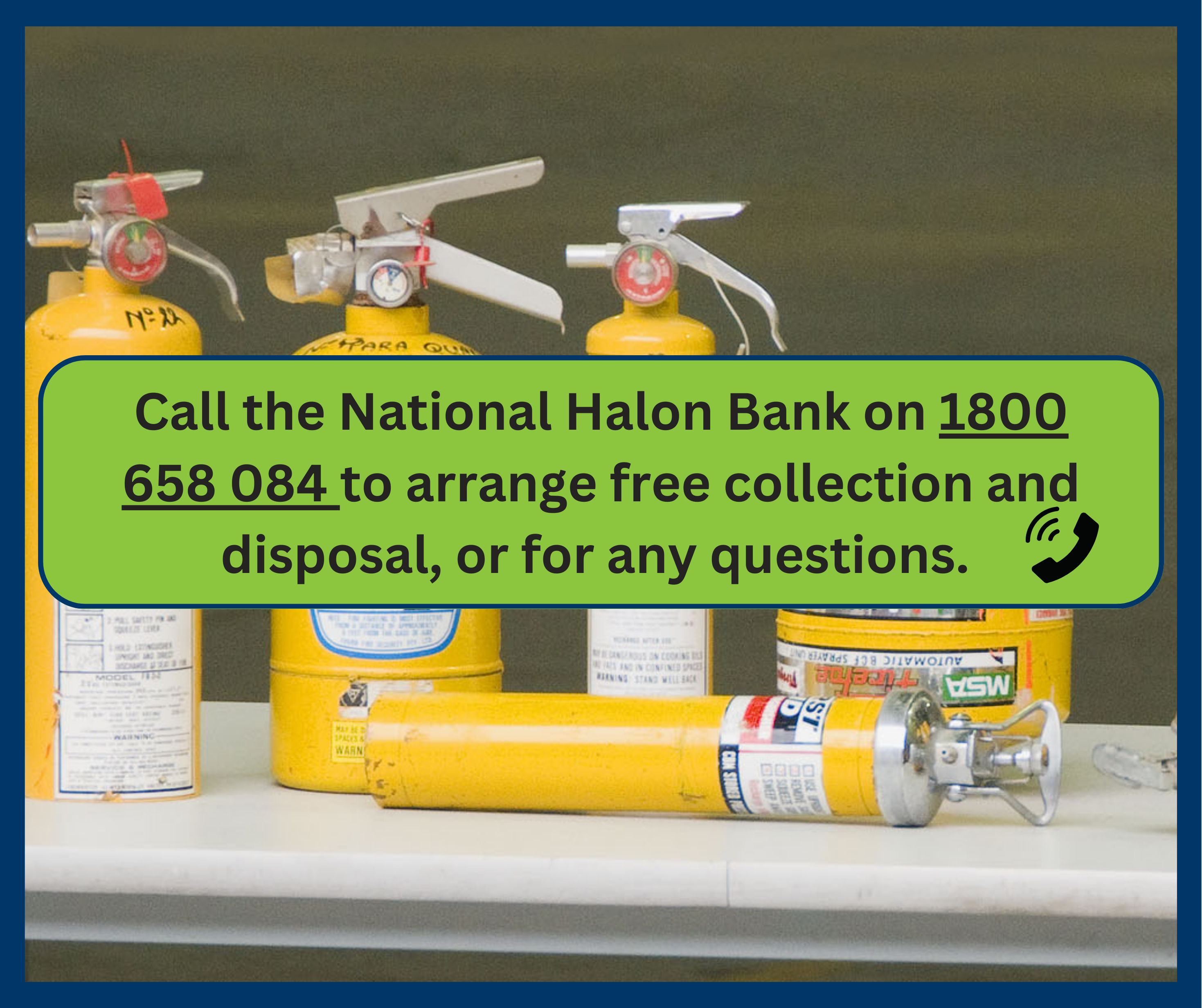
Did you know: One kilogram of halon can destroy 50 tonnes of ozone?
The Fire Protection Industry Board (FPIB) is reminding anyone who currently possesses Halon the National Halon Bank (NHB) continues to be in operation for collection and safe handling.
As a highly dangerous chemical with extreme Ozone Depleting Potential (ODP), the Board asks for any person possessing a fire extinguisher containing Halon to surrender this item to their local halon collection point, EATA holding companies, which can be found here, or local fire station.
The FPIB is also asking once again for fire stations around Australia to help prevent the accidental discharge of this environmentally damaging chemical by accepting these extinguishers should you be presented with one.
Once accepted, the fire station should place the extinguisher in a safe and secure place and then contact the National Halon Bank (NHB) to organise a pick-up.
Should you have any queries, the NHB operates a free call service to advise on disposal of halon and also operates a free service for the general public and small businesses to dispose of halon.
Call the NHB on 1800 658 084 to arrange free collection and disposal, or for any questions.
For more information, click the link below.
https://www.fpib.com.au/education/halon-campaign/
Field Engagement Report August 2024
In August 2024, 86 Permit Condition Checks (PCCs) were completed.
- 79 EAHL permit holders
- 7 EATA permit holders
- 0 HSP permit holders

Broken down into states, these numbers are as follows:
- New South Wales (NSW) – EAHL – 19
- Queensand (QLD) – EAHL – 35, EATA – 2
- South Australia (SA) – EAHL – 15, EATA – 2
- Victoria (VIC) – EAHL – 10
Many outcomes have been uncovered during these PCCs. For 23/86 permit holders, there has been no further action required. Discharge Reporting Education, as always, has been one of the most prevalent outcome, with 23/86 permit holders receiving some education on how, when and why to report discharges. Inerestingly the outcome that has tracked the most this month was Stickers Requested, with 28/86 permit holders requesting stickers for cylinders or panels.
Outcomes range from simple education required, to non-compliance which needs to be rectified by the permit holder.
There were no HSP PCCs completed in August.
Non-compliance
There have been 6 permit holders found to be non-compliant.
4 EAHL permit holders were undertaking works outside their EAHL entitlement class.
1 EAHL permit holder was working with an expired licence.
1 EATA permit holder was not up to date with submitting their Quarterly Usage Reports.

New Permit Holders
There have been 12 new permit holders in August 2024 (EAHL – 12, EATA – 1).
2 of these are Trainee EAHL permits.
18 EAHL permits have been renewed, and 4 EAHL permits had lapsed and have now been re-activated.
Field Engagement Report July 2024
The FPIB Field Engagement team continued its work out in the field throughout July, engaging with permit holders across the country.
In total, 92 Permit Condition Checks (PCCs) were completed. This included:
- 89 EAHL permit holders
- 3 EATA permit holders
- 0 HSP permit holders
Broken down into states and permit types, these numbers are as follows:
- New South Wales (NSW) – EAHL – 14, EATA – 1
- Queensand (QLD) – EAHL 27, EATA – 2
- South Australia (SA) – EAHL 22
- Victoria (VIC) – EAHL – 10
- Western Australia (WA) EAHL – 16
Many outcomes have been uncovered during the PCCs for July. For 20/92 permit holders, there has been no further action required. permit condition checks, there has been no further action required. Discharge Reporting Education, continues as always, to be the most prevalent outcome, with 44/92 permit holders receiving some education on how, when and why to report discharges. Outcomes range from simple education required, to non-compliance which needs to be rectified by the permit holder, with the second most prevalent outcome of EAHL Permit Condition Checks’s being education on safe disposal.
Detailed outcomes by permit type can be seen in the graphs provided below:


There were no HSP PCCs completed in July.
Non-compliance
There have been 2 permit holders found to be non-compliant.
2 EAHL permit holders were undertaking works outside their EAHL entitlement class.

Resolved Non-compliance
In July, there have been two non-compliance resolved, these were both from the previous financial year. One for conducting works outside EAHL permit type (resolved by applying for Experienced EAHL 6, as the permit holder was already a licenced electrician. The second for allowing their permit to lapse and working without renewing their EAHL permit.

Discharge Reports Received
There have been two (2) discharge reports received in July, as a direct result of a Permit Condition Check being conducted.
New Permit Holders
There have been 13 new permit holders in July 2024.
6 of these are for Trainee EAHL permits.
23 EAHL permits have been renewed, and 11 EAHL permits had lapsed and have now been re-activated.
Field Engagement Report June 2024
The FPIB Field Engagement team continued its work out in the field throughout June, engaging with permit holders across the country.
In total, 106 Permit Condition Checks (PCCs) were completed. This included:
- 95 EAHL permit holders
- 9 EATA permit holders
- 2 HSP permit holders

Broken down into states and permit tpyes, these numbers are as follows:
- Australian Capital Teritory (ACT) – EAHL – 8
- New South Wales (NSW) – EAHL – 32, EATA – 2
- Queensand (QLD) – EAHL 43, EATA – 2
- Victoria (VIC) – EAHL – 12, EATA – 5, HSP – 2
Many outcomes have been uncovered during these PCCs. For 33/106 permit holders, there has been no further action required. Discharge Reporting Education, as always, has been the most prevalent outcome, with 34/106 permit holders receiving some education on how, when and why to report discharges.
Outcomes range from simple education required, to non-compliance which needs to be rectified by the permit holder.
Outcomes per permit type can be seen below in the following graphs:



Non-compliance
There have been 5 permit holders found to be non-compliant.
- 1 EAHL permit holder was undertaking works outside their EAHL entitlement class.
- 1 EAHL permit holder held the incorrect licence entitlement class.
- 1 EATA and 1 HSP permit holder had not submitted Quarterly Usage Reports.
- 1 EATA permit holder had no EAHL holder on site or the EAHL holder did not hold the appropriate licence entitlement.

As non-compliance resolution is an ongoingmatter, the graph below represents ALL non-compliance found and resolved for the year to date.
In total for the calendar year to the end of June, there have been 37 different incidents of non-compliance found, from 27 permit holders – this means that some permit holders have been found to have multiple different non-compliance present during their Permit Condition Check. The Board has followed up with all permit holders who have been found non-compliant and ensured this is being addressed.
Record fines for imports without licence
Tuesday 9 July, 2024
The Department of Climate Change, Energy, Environment, and Water (DCCEEW) have published a media release on their record fines for imports without a licence.
“The department has issued a record total of $465,480 in fines to a company for importing electrical switchgear containing synthetic greenhouse gas without a licence.
Investigators from the department and the Australian Border Force (ABF) found that the Australian arm of a multi-national company imported equipment containing sulphur hexafluoride (SF6)—the most potent synthetic greenhouse gas—without a licence.”
Click here, to read the complete media release.
Update on Penalties Amendment:
The Fire Protection Industry Board would like to inform all permit holders of an important update on upcoming amendments to the Ozone Protection and Synthetic Greenhouse Gas Management Amendment (2024 Measures No. 1) Regulations 2024. Starting from July 1st 2024, these amendments will see an increase of penalties for breaches, from ten to 50 units.
Additionally, civil penalties provisions will now apply to ALL offenses under the Regulations.
To avoid any penalties, stay informed, adhere to best practice when handling and managing scheduled extinguishing substances and make sure you are compliant.
For further details on the amendments and specific changes to the Regulations visit here.
Field Engagement Report May 2024
The FPIB Field Engagement team were pleased to continue to its work on the ground engaging with permit holders across the country with a large number of Permit Condition Checks conducted.
In total, 100 Permit Condition Checks (PCCs) were completed throughout May. This included:
- 90 EAHL permit holders
- 8 EATA permit holders
- 2 HSP permit holders

The number of permit condition checks broken down across states are as follows:
- New South Wales (NSW) – EAHL – 24, EATA – 4, HSP – 1
- Queensand (QLD) – EAHL 17
- Tasmania (TAS) EAHL – 20, EATA – 2
- Victoria (VIC) – EAHL – 29, EATA – 2, HSP – 1
More details on the specific outcomes from the conditions checks for each permit type can be seen via the tables below:



Many outcomes have been uncovered during these PCCs. For 32/100 permit holders, there has been no further action required. Discharge Reporting Education has been the most prevalent outcome, with 37/100 permit holders receiving some education on how, when and why to report discharges, with two discharges report received throughout this period as a direct result of a Permit Condition Check being conducted.
Other outcomes of these checks range from simple education required, to non-compliance which needs to be rectified by the permit holder.
In total, ten permit holders were found to be non-compliant throughout the checks conducted in May. This includes:
- 5 EATA permit holders who have not submitted Quarterly Usage Reports on time.
- 2 EATA permit holders who had issues around their Risk Management Plan.
- 1 EAHL permit holder who was undertaking works outside their EAHL entitlement class.
- 2 EAHL permit holders who had allowed their permit to expire and had not renewed their permit at the time of their PCC/
The FPIB Field Engagement team were very quick to address these cases of non-compliance with the permit holders and provided education on the steps needed to be taken to be compliant with the relevant act and regulations, and the crucial role they play in a creating a safer environment and workplace. The Board continues to engage and monitor all ongoing non-compliance related matters to ensure they are resolved by the relevant permit holders.
The Board continues to look forward to carrying out this work and has found these checks to be very helpful and insightful in not only being able to impart best practice knowledge on to permit holders but in also ensuring compliance.
Field Engagement Report April 2024
The FPIB Field Engagement team were pleased to expand the scope of the program in April, visiting five states in total across Australia throughout the month. The Board engaged with a number of permit holders using scheduled extinguishing substances during this period, conducting a total of 81 permit condition checks. This included:
· 58 EAHL permit holders
· 15 EATA permit holders
· 8 HSP permit holders
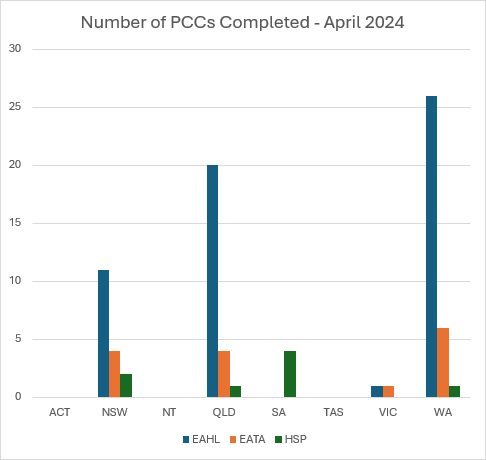
The number of permit condition checks broken down across states are as follows:
- New South Wales (NSW) – EAHL – 11, EATA – 4, HSP – 2
- Queensand (QLD) – EAHL 20, EATA – 4, HSP – 1
- South Australia (SA) HSP – 4
- Victoria (VIC) – EAHL – 1, EATA – 1
- Western Australia (WA) EAHL – 26, EATA – 6, HSP – 1
Only two instances of non-compliance were found throughout this period and they were:
1 EATA permit holder who had not submitted Quarterly Usage Reports on time.
1 HSP permit holder had not submitted Quarterly Usage Reports on time.
Two discharge reports were also received in April as a direct result of a permit condition check being conducted.
The Field Engagement team were very quick and happy to address these cases of non-compliance and the discharges reported with the permit holders and provided information on the steps needed to be taken to comply and best practice in fire safety and how to avoid a discharge.
More details on the specific outcomes from the condition checks for each permit type can be seen via the tables below.
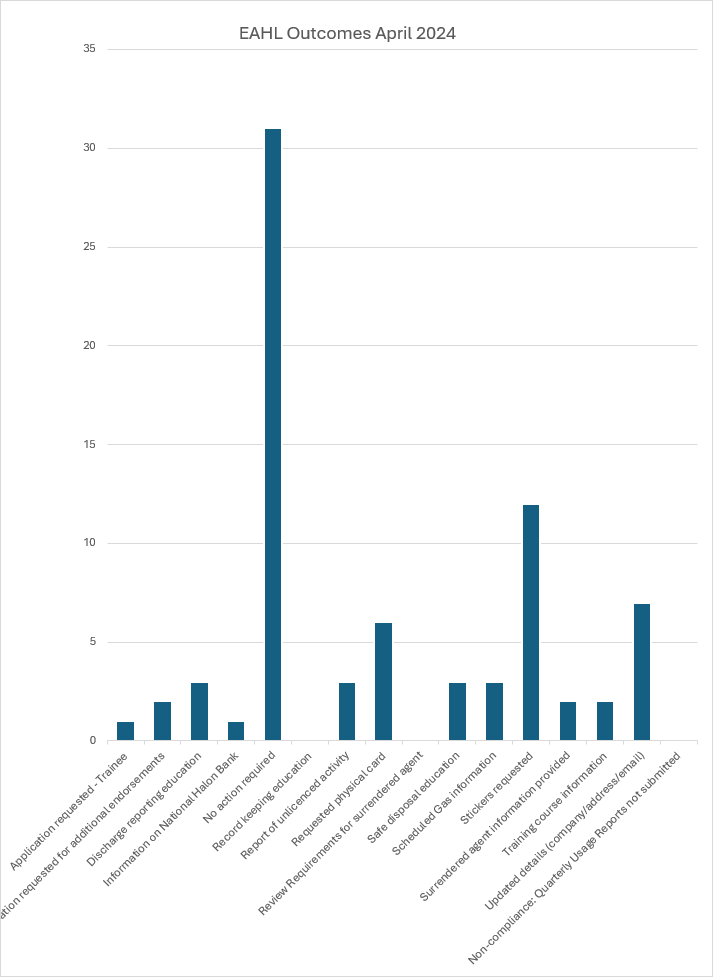
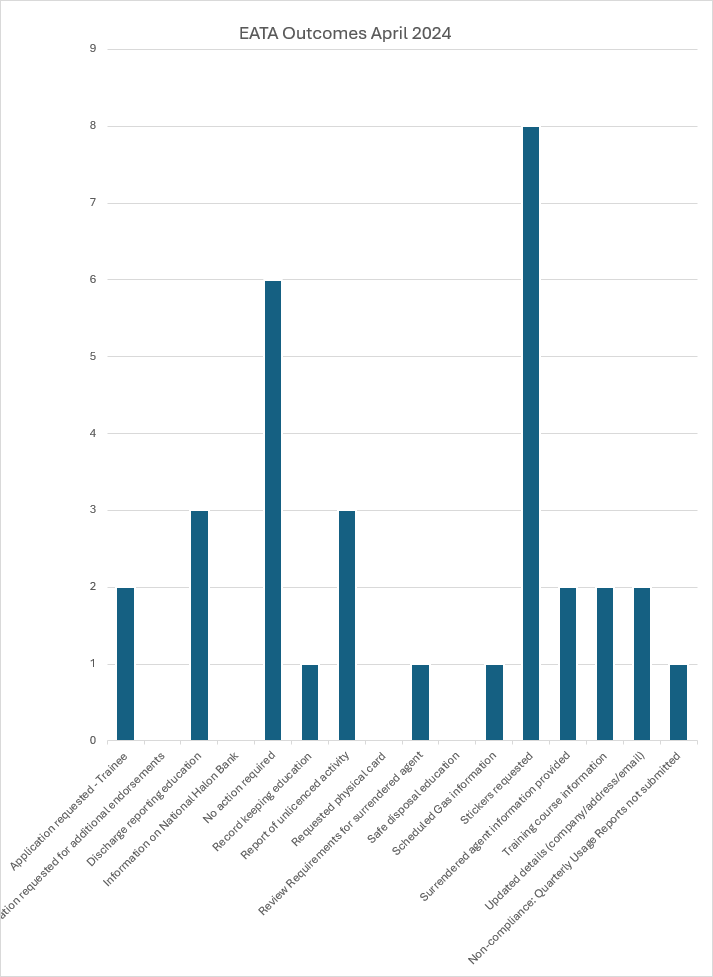
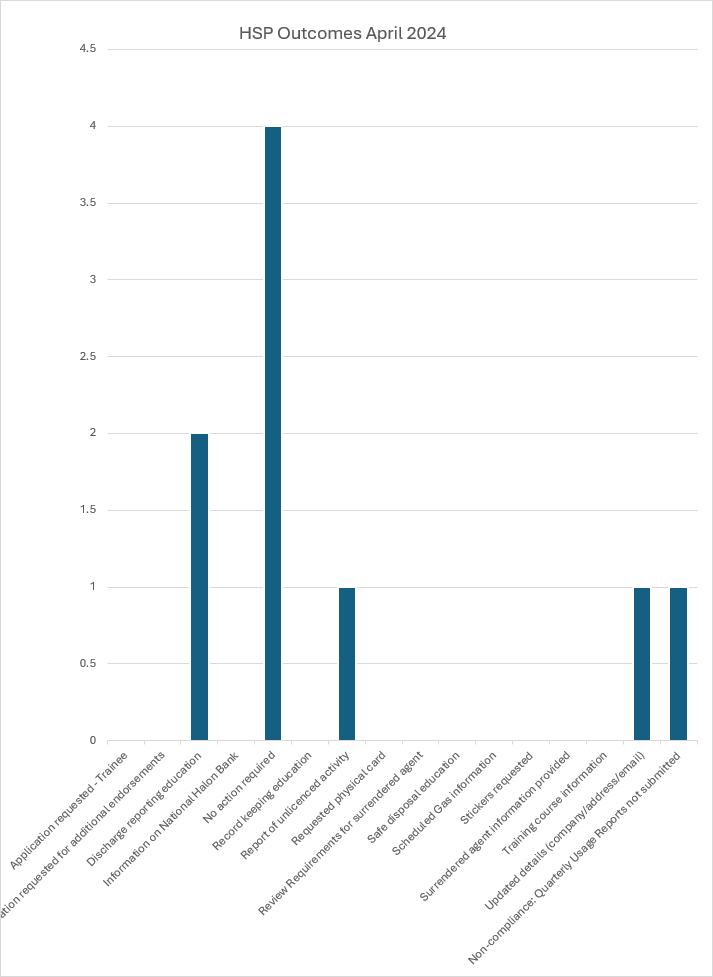
The Board continue to be pleased with the progress of the Field Engagement program and are pleased to have increased the scope of the program with more states of Australia visited in April. The Board is delighted to be actively engaging with our permit holders, to interact with them, address inquiries, and provide additional education to ensure best practice and compliance. These meetings serve as an invaluable method for maintaining transparent communication between the Board and our permit holders and our focus continues to be ensuring that all parties understand their responsibilities and are knowledgeable about best practices in handling scheduled substances safely, leading to positive results for all involved.
We thank everyone who has participated in a permit condition check so far and invite permit holders to arrange one here.
Field Engagement Report March 2024
The FPIB Field Engagement team have made major inroads on engaging with permit holders using scheduled extinguishing substances throughout March. In total, 101 Permit Condition Checks (PCCs) were completed throughout the month of March, with visits made across New South Wales, Victoria and Queensland. This included 71 EAHL checks, 25 EATA checks and 5 HSP checks.
Broken down into states, the number of licences checked, are as follows:
- New South Wales (NSW): EAHL – 28, EATA – 6, HSP – 2
- Queensand (QLD): EAHL 27, EATA 12
- Victoria: EAHL – 16, EATA – 7, HSP – 3
There were many outcomes resulting from the March Permit Conditions Checks, ranging from simple education required, to non-compliance which needs to be rectified by the permit holder.
The full breakdowns of the outcomes found from the Permit Condition Checks across each licence type, EAHL, EATA and HSP can be seen in the following graphics:
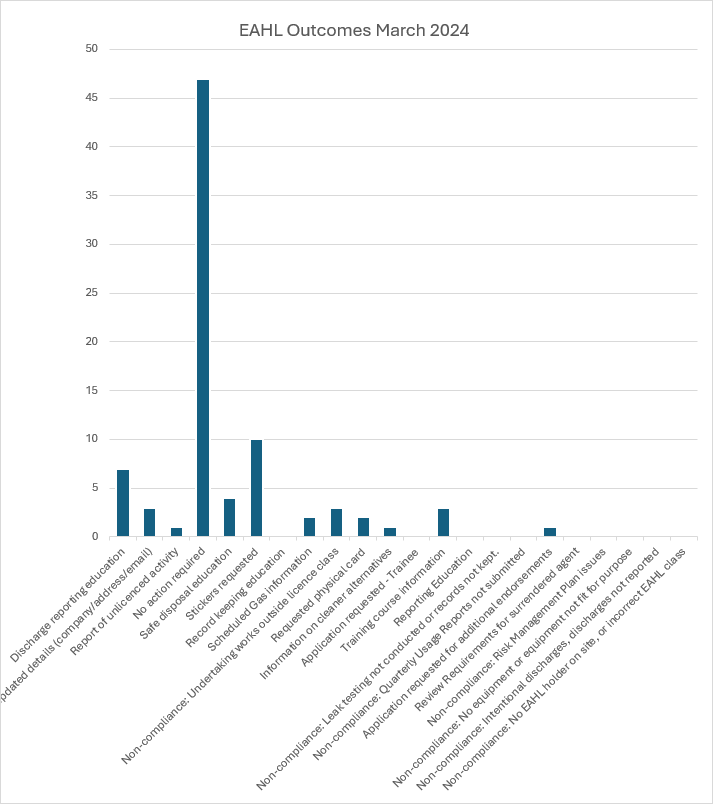
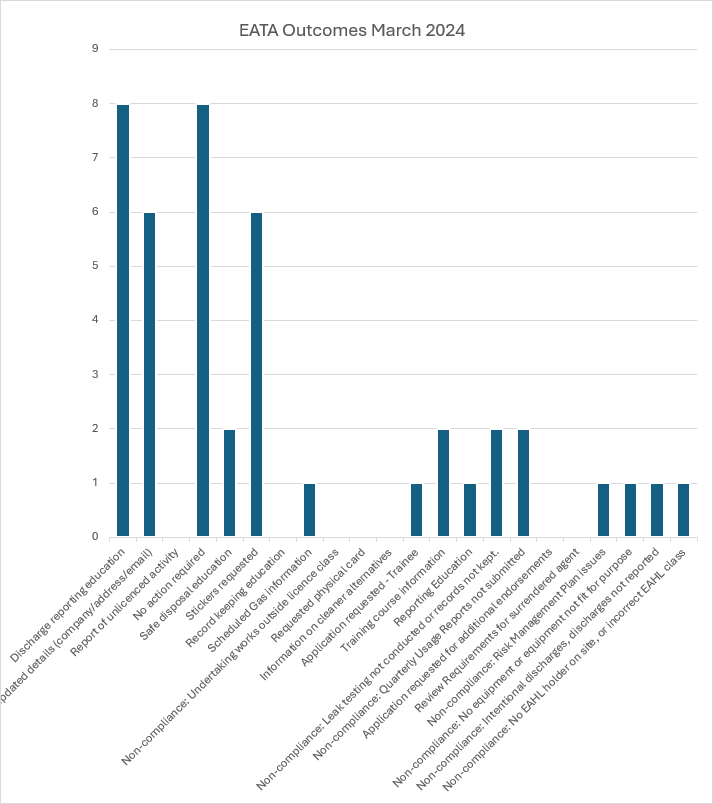
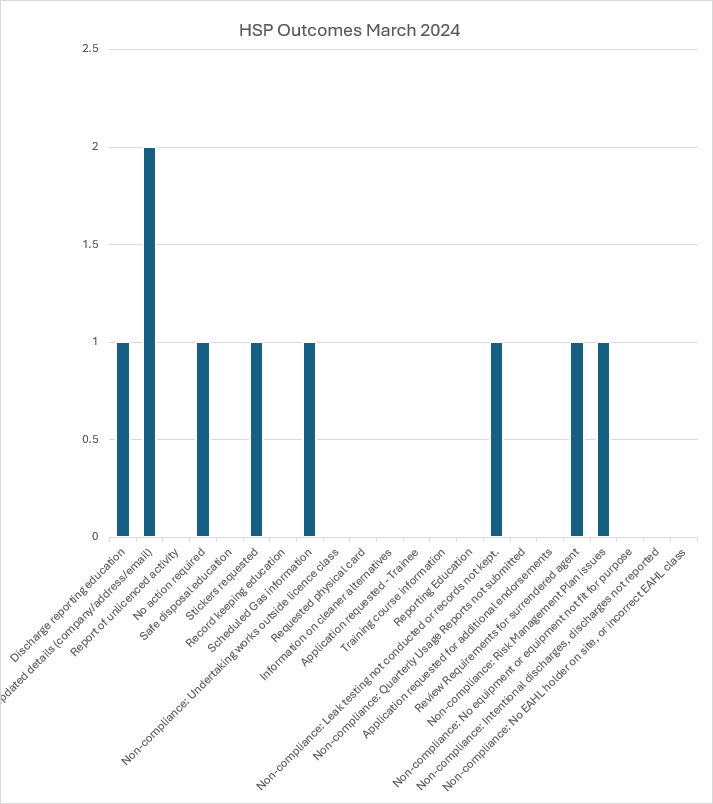
The permit condition checks conducted throughout March proved to be very fruitful for the Board in connecting with permit holders and providing further education on best practice when handling, using and or managing scheduled extinguishing agents.
Overall, 9 permit holders had been found to be non-compliant through the checks conducted throughout this period. Instances of non-compliance across the licence types that were identified, included:
- 5 EAHL permit holders found to be conducting works outside the scope of their EAHL type.
- 3 EATA permit holders not submitting their Quarterly Usage Reports on time.
- 1 EATA permit holder found to not be leak testing or keeping records any leaks.
- 1 EATA permit holder had issues with their Risk Management Plan.
- 1 EATA permit holder had no equipment or had equipment that was not fit for purpose.
- 2 EATA permit holders had made intentional discharges which had not been reported.
- 2 EATA permit holders had no EAHL holder on site, or had an EAHL permit holder with the incorrect licence class.
- 1 HSP holder had not submitted Quarterly Usage Reports on time.
The FPIB Field Engagement team were very quick and happy to address these cases of non-compliance with the permit holders and provided education with these holders on the steps needed to take to be compliant with the relevant act and regulations, and the crucial role they play in a creating safer environment and workplace.
Ultimately, The Board continues to be pleased to be out in our community, meeting with permit holders to engage with them, answer questions, and further educate our permit holders. These meetings are an incredibly valuable way of keeping open the channels of communication between the Board and our permit holders and facilitating education on best practice. Ensuring all parties are across their obligations and are aware of best practice in the safe handling of scheduled substances continues to be our primary focus and has positive outcomes for everyone.
If you would like to arrange your own visit, please use our booking form, and one of our Field Engagement Officers will be in touch with you as soon as possible.
Field Engagement Report February 2024
The Board is pleased to have begun the year by successfully launching the 2024 Field Engagement Program and it has been a busy start already.
Within the first few weeks of beginning, the Field Engagement team have made 38 site-visits and permit condition checks across New South Wales, Victoria, and Queensland. When broken down into different the different permit types, this includes 34 EAHL checks, 4 EATA checks, and 0 HSP checks.
The various outcomes for each permit type included:
➔ Updating details of Permit Holders(EAHL – 6, EATA – 1)
➔ Education on discharge reporting (EAHL – 4)
➔ Education on safe disposal of scheduled gases (EAHL – 1)
➔ Stickers requested (EAHL – 4, EATA – 1)
➔ Providing information on scheduled gas (EAHL – 2)
➔ Capturing reports of unlicenced activity in the industry (5)
➔ Addressing issues of Non-Compliance – with works undertaken without a licence outside of class (EAHL – 1)
From the latest visits the Board received three reports of potential unlicensed activity for further investigation, and one individual self-reported that they were unknowingly conducting activities outside their licensing entitlements. This person is now undertaking further training to ensure they’re meeting the conditions of their licence. The most common issue our field officers are discovering is that permit holders have out of date contact details, such as work email addresses changing. If this is something that you’ve forgotten to let the Board know about, please reach out and let us know! Lastly, multiple permit holders were unsure when and how to report a discharge incident to the Board. If you are unsure, all discharges of any scheduled ODS & SGG extinguishing agents should be reported to the Board via the discharge reporting form, found here.
The Board are pleased to be out in our community, meeting with permit holders to engage with them, answer questions, and further educate our permit holders. These meetings really open the channels of communication and promote dialogue between the Board and our permit holders, as well as ensuring that our permit holders are meeting the conditions of their permit.
If you would like to arrange your own visit, please use our booking form, and one of our Field Engagement Officers will be in touch with you as soon as possible.
Field Engagement Report January 2024
In January, the Board was pleased to continue its work preparing for the 2024 Field Engagement Program, with permit condition checks to begin in February. A key part of this work was the onboarding of two new team members, Gareth Anderson and Tony Castellarin to the Field Engagement Program, as the Board’s new Field Engagement Officers.
The Board is confident that the work it has conducted throughout January has put it in good stead for a successful commencement of the Field Engagement Program and that the team is well placed to gather valuable feedback, address industry challenges, and promote continuous improvement in compliance and fire safety standards. Pleasingly, within the first month of the year, the Board’s Field Engagement team were already able to schedule permit checks throughout February across sites in Victoria, New South Wales, and Queensland.
Through collaborative efforts and knowledge sharing, the Field Engagement activities will play a crucial role in enhancing the overall resilience and efficiency of fire protection systems, whilst ensuring compliance with the Ozone Protection and Synthetic Greenhouse Gas Management Act 1989 (the Act) and the Ozone Protection and Synthetic Greenhouse Gas Management Regulations 1995 (The Regulations).
FPIB Annual Report 2022-2023
25 January, 2024
The period, covering 1 July 2022 to 30 June 2023, saw the Fire Protection Industry (ODS & SGG) Board (FPIB) undertake a large scope of work across five key strategic objective areas: technology, compliance, industry engagement, discharge reporting, and training.
In the context of the large scope of work that was undertaken by the FPIB over this period, we believe we have taken strides toward achieving our ultimate goal of reducing emissions of scheduled extinguishing substances. Engaging with industry face-to-face has been high point of this financial year and one that we have seen many successes from.
Through a combination of communicating with industry stakeholders, collaborating with the department, and being guided by the IAB’s expertise where necessary, we have made valuable inroads in understanding industry trends and issues. This means we now have greater scope to plan future engagement and education activities in areas they are most required.
Permit Fee Freeze in 2024
20 December, 2023
Permit scheme fees in 2024 will be the same as in 2023. To make sure licences are financially accessible amidst cost-of-living pressures, the Department of Climate Change, Energy, the Environment, and Water (DCCEEW) has announced the freezing of permit fees for 2024.
Maintaining fees at their current level, sends a clear message about the government’s dedication to the permit scheme’s accessibility. By easing the financial burden associated with permit fees, DCCEEW aims to empower businesses and individuals to prioritise reducing emissions, without sacrificing economic viability
The following table shows the permit fees and durations for 2023 and 2024.
| Permit type | Duration | 2023 application fees | 2024 application fees |
| Extinguishing Agent Handling Licence – Qualified Persons |
3 years | $468 | $468 |
| Extinguishing Agent Handling Licence – Experienced Persons |
3 years | $468 | $468 |
| Extinguishing Agent Trainee Licence | 1 year | $156 | $156 |
| Extinguishing Agent Trading Authorisation | 3 years | $786 | $786 |
| Halon Special Permit | 3 years | $939 | $939 |
Site Visit Program
18 February 2023
The site visit program is expanding! The Fire Protection Industry (ODS & SGG) Board (FPIB) has commenced its on-site program throughout Victoria and is now expanding to all of Australia.
The program’s aim is to increase compliance and awareness of the fire protection industry permit scheme across the board. The face-to-face visits will ensure permit conditions are being met, whilst at the same time increasing education on best practice.
We will be reaching out to our permit holders for these visits soon, in the meantime, why not brush up on what procedures should be in place to ensure compliance through our self-assessment checklists.
To find out more about site visits and what they involve, contact [email protected].
Increase to permit application fees in 2023
23 December 2022
The Ozone Protection and Synthetic Greenhouse Gas Management Regulations 1995 (Regulation 346) provides for the annual indexation of permit application fees.
The annual indexation formula uses the Wage Price Index (WPI) figures published by the Australian Bureau of Statistics. Consistent with the WPI figures for the September 2022 quarter, the fire protection industry permit application fees will increase by 3.192% per cent from 1 January 2023.
The following table shows the permit fees and durations for 2022 and 2023.
| Permit type | Duration | 2022 application fees | 2023 application fees |
| Extinguishing Agent Handling Licence – Qualified Persons |
3 years | $453 | $468 |
| Extinguishing Agent Handling Licence – Experienced Persons |
3 years | $453 | $468 |
| Extinguishing Agent Trainee Licence | 1 year | $151 | $156 |
| Extinguishing Agent Trading Authorisation | 3 years | $762 | $786 |
| Halon Special Permit | 3 years | $909 | $939 |
Emission target on track
Media release
13 October 2022
The Australian Government is on track to meet its goal of a 30% reduction in harmful emissions from ozone depleting substances (ODS) and synthetic greenhouse gases (SGG) by 2030.
To learn more about the work the Department of Climate Change, Energy, Environment and Water (DCCEEW) is doing in conjunction with the Fire Protection Industry (ODS & SGG) Board to meet its target, read the full media release found here.
New laws to reduce emissions and continue healing the ozone layer
Media release
28 September 2022
The Albanese Government will today introduce a new Bill that will see stronger measures to reduce Australia’s greenhouse gas emissions and continue to play its part in helping heal the world’s ozone layer.
The Ozone Protection and Synthetic Greenhouse Gas Management Reform (Closing the Hole in the Ozone Layer) Bill 2022 will modernise and streamline Australia’s laws to manage ozone depleting substances and synthetic greenhouse gases.
Australia’s ozone legislation controls the import and use of ozone depleting substances and synthetic greenhouse gases—both of which are commonly used in refrigeration and air conditioning, fire protection, aerosols and insulating foam.
The control and phase-out of ozone gases stems from the highly successful Montreal Protocol – the most successful global environment treaty ever signed. To date, the Protocol is the only UN treaty ratified by every UN member state; in Australia it was ratified by the Hawke Government in 1989.
This legislation helps Australia manage the chemicals that destroy the ozone layer, which is the part of the atmosphere that insulates and protects the planet from the sun’s rays.
Some ozone depleting chemicals to be managed by the legislation are also synthetic greenhouse gases – fluorinated gases, primarily hydrofluorocarbons (HFCs), which are thousands of times more potent than carbon dioxide.
HFCs make up only 2 per cent of the world’s greenhouse gas emissions but their use is growing rapidly because of increasing demand for air conditioning. Their potency means that even at 2 per cent, they have a disproportionately high impact on our climate.
The Government is working closely with industry to phase down the use of HFCs by 85% between 2018-2036. We already have in place requirements for technicians to be fully trained and to safely recover HFCs from old equipment through a world leading, industry funded and operated, product stewardship scheme.
The changes set out in the Bill to be introduced today will ensure that Australia’s management program remains efficient and effective.
You can read the full media release here.
Media Release
14 September 2022
Who’s looking after our Air?
With the pandemic sweeping across the globe just months after the catastrophic summer bushfires of 2019-2020, it is no surprise the media’s attention was diverted from a nation-wide catastrophe to one of global scale.
However, now it’s 2022, a question lingers: how are we going with our climate change efforts, specifically air quality?
The Department of Climate Change, Energy, Environment and Water (DCCEEW) monitors the ozone emissions (ozone depleting substances) caused by the air conditioning, refrigeration, and fire protection industries, and with recent insight from the 2021 State of Environment Report it is no surprise there was a spike in short-term pollution following the 2019-2020 bushfires.
Despite this setback, the DCCEEW are positive they remain on track to meet the targeted 30% emission reduction by 2030. To ensure this, they have been continuously working alongside the Fire Protection Industry Board (FPIB) to carry out strategic programs aimed at minimisation of ozone depleting substances (ODS) and synthetic greenhouse gas (SGG) discharges, as well as thorough education on handling of such substances and license regulation.
End
To read the full 2021 State of Environment Report, click here. For more information regarding license types, training and discharge reporting contact the FPIB at: [email protected]
Disposing of scheduled agents correctly to avoid ODS and SGG emissions
28 June 2022
End users should be aware that decommissioning of a fire suppression system, containing a scheduled extinguishing agent, is only to be carried out by an individual holding an extinguishing agent handling licence (EAHL).
If you or your company requires further information on the correct and safe disposal of scheduled extinguishing agents, please refer to our recent article in GasBag which covers this topic in greater detail.
Cleaner Alternatives to ODS and SGG Products
28 June 2022
Are you and your employer considering alternative options when working with clients?
The Australian Government is committed to the reduction of substances listed under the Montreal Protocol and the United Nations Framework Convention on Climate Change. There is a selection of clean alternatives to ODS and SGG products available including Inert & Synthetic gases, hybrids & Co2.To read up on more details relating to these alternatives, please refer to our latest GasBag newsletter.
Need to report a discharge of a scheduled extinguishing agent?
15 FEBRUARY 2022
The FPIB is calling on fire protection companies to come forward and report any recent discharge incident involving an ozone depleting substance (ODS) or synthetic greenhouse gas (SGG) that you are aware of. This applies to any recent emission that has taken place at your work site or an incident one of your employees may have witnessed at another site as a contractor.
Minimising the risk of discharge not only benefits our natural environment, but it also helps fire protection companies and end users to preserve their capital as scheduled agents can be costly to replace.
The discharge notification form can be found here.
Please note this form has recently been updated and can now be completed on your desktop without the hassle of having to print and scan. Simply open the weblink above, download and save to your desktop (arrow in the top right hand-corner) and then fill in the form before sending to [email protected]
If you require further information/education on discharge prevention, please refer to our flyer.
Increase to permit application fees in 2022
20 DECEMBER 2021
The annual indexation formula uses the Wage Price Index (WPI) figures published by the Australian Bureau of Statistics.
Consistent with the WPI figures for the September 2021 quarter, the fire protection industry permit application fees will increase by 2.227% per cent from 1 January 2022.
The following table shows the permit fees and durations for 2021 and 2022.
| Permit type | Duration | 2021 application fees | 2022 application fees |
| Extinguishing Agent Handling Licence – Qualified Persons |
3 years | $444 | $453 |
| Extinguishing Agent Handling Licence – Experienced Persons |
3 years | $444 | $453 |
| Extinguishing Agent Trainee Licence | 1 year | $148 | $151 |
| Extinguishing Agent Trading Authorisation | 3 years | $744 | $762 |
| Halon Special Permit | 3 years | $888 | $909 |





















